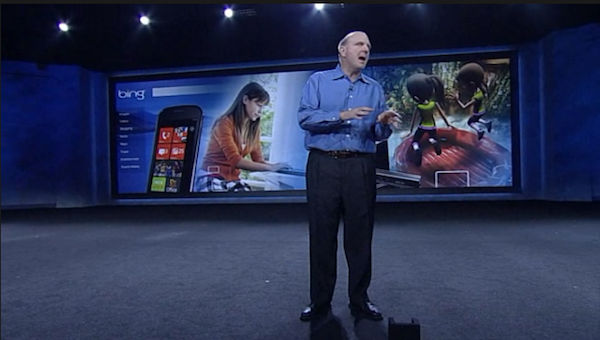Hey, Steve Ballmer, where's the beef?

Critics, and even customers, accuse Microsoft of being empty, of having exhausted its innovation -- and for many of them that means imitation. Microsoft is often called he great imitator. At first glance, last night's opening Consumer Electronics Show keynote given by Microsoft CEO Steve Ballmer fits the bill. The keynote felt empty, and short. Microsoft didn't even show off something substantially new about tablets, which is one of the event's hottest product categories this year. The rumors about a tablet operating system were wrong.
What is Las Vegas? It's a place to be entertained (and, yes, gambling is one of the recreations). I think of Vegas as where entertainers who have passed their peak of popularity go. It is the city of celebrity has-beens. Perhaps then, Ballmer was where he belonged.
But from a different perspective, Ballmer and Microsoft aren't has-beens at all. Microsoft isn't a consumer company. Sure, hundreds of millions of consumers use Microsoft software, but the company earns most of its income selling to businesses, particularly enterprises. Microsoft has yet to see its star really rise over the consumer market. Sure, Xbox, Xbox Live and Kinect are popular consumer products, but they don't sustain Microsoft and they are no means its primary focus.
Over the consumer market, Microsoft's star is still rising. Last night, Ballmer and the Microsoft employees giving product demos peeked into Microsoft's consumer -- and even business -- market future. The stage delivery was tame, but the implications are ferocious. Microsoft wants to fundamentally change how we interact with computing devices. The company is in process of redefining user interfaces, and Xbox Kinect shows the way. Users command Kinect with their hands, arms and voice. A new forthcoming feature responds to facial expressions. Then there is Surface, which responds to touch.
We Are Tool Users
Human beings are tool users who experience and manipulate the world through five senses. Eyes are passive instruments, while hands and fingers are more important because they are active -- they're how people tactilely manipulate the world around them.
For example, how important is touch? Watching how people interact with items for sale reveals much. First people look -- and then they touch. Surely, many retailers find all that touching and handling of their goods to be irritating. People examine objects they desire as much with their hands as their eyes.
Too many technological devices are too difficult to use because they expose too much complexity. Compare to the human body: The underlying biological mechanisms behind hand movement may be complex, but for most people the complexity is largely hidden. The keyboard is unnatural user interface; it exposes too much complexity. There is little in human biological or cultural experience that supports use of the keyboard. It's a particularly unnatural construct, in which organization is based on the number of times letters are likely to be used. The mouse is more natural than the keyboard, because of the hand and finger-clicking movement. But the mouse is still a makeshift extension of the human being.
The finger and touch are more natural, because they extend you. Good user interfaces build on the familiar -- and there is nothing more familiar than me, myself and I. Successful user interfaces of the future will have similar attributes.
Ballmer showed the future last night, and some of it is here and now with Kinect and Surface 2.0. Microsoft is looking to make technology device interaction more meaningful by using all five senses and making hands, arms, facial movements and voice means of commanding and controlling tech gadgets. There was substance -- and lots of it -- in the keynote, after all.
This morning, I've read several commentaries asserting that Ballmer's keynote lacked substance. They're asking, as did the grandma in 1980s Wendy's hamburger commercials: "Where's the beef?" I say that Ballmer merely set out the entrees -- that the meal is yet to come. The chef is preparing the food fresh, and it's not quite ready to serve. Be patient. Wait for it.